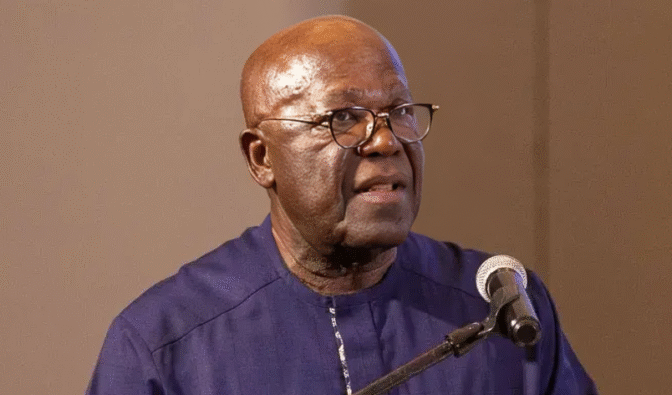-Says Galamsey, Corruption sponsored by Elites Silence
-Demands Architectural revolution to save Ghana’s Cultural Soul
Mining mogul Samuel Esson Jonah has ignited a firestorm of controversy, boldly condemning Ghanaian architects as “cowardly complicit” in the nation’s ongoing “Galamsey Hell” and rampant corruption.
He urges them to wake up, abandon their fixation on Dubai illusions, revive traditional building techniques, or risk allowing corruption to obliterate Ghana’s cultural soul.
Jonah’s blistering critique came during the Ghana Institute of Architects’ Annual General Meeting on November 20, 2025, where he did not mince words, labeling the architectural profession as spineless enablers in a “crime scene” nation.
The devastation wrought by galamsey illegal mining that poisons our rivers and ravages our forests coupled with the obsession with imported cement that drains national resources, has led to a stark erasure of our heritage.
Jonah implored architects to channel their inner warriors, standing up for mud-built artistry, sustainable design, and fierce anti-corruption measures. “Or risk disappearing into history’s dumpster as spineless sellouts!” he warned.
From the podium at the Pempansie Hotel overlooking the somber slave castles of Cape Coast Jonah passionately questioned, “What will our buildings scream about us?” He lambasted Ghana’s infatuation with the ostentation of Dubai while neglecting the rich, earthy culture rooted in Ghanaian tradition.
He decried the abandonment of ancestral building techniques, which utilize mud, laterite, timber, clay, and coconut, all of which harmonize with the land.
“We’re forking over billions in imports, wrecking our foreign reserves and choking the planet, all while Burkina Faso turns mud into masterpieces and Kenya creates bamboo wonders!” he proclaimed.
Jonah called for a revival of local aesthetics, challenging architects to transition from mere adaptation to genuine cultural celebration, valuing Ghana’s wealth instead of blindly imitating others.
He delivered a blistering indictment of the profession itself, asserting that architects are not just sketch artists; they are standard-setters, guardians of beauty, and essential public watchdogs.
He lamented that the silence on unethical practices amounts to complicity, leading to construction failures that endanger lives. “Your silence is complicity in impunity,” he asserted, confronting a profession that has allowed environmental degradation and shoddy design to proliferate unchallenged.
He pulled no punches as he addressed the larger issues afflicting Ghana: architects’ “deafening silence” in the face of rampant galamsey destruction polluting rivers and ruining communities demonstrates a grave abdication of responsibility.
“Where was your outrage when corruption’s rampant greed turned our nation into a haven for gangsters, with citizens treated as mere doormats?” Jonah demanded, invoking the courage of 1970s advocates who bravely opposed military tyranny.
When foreign firms circumvent local ethics and hijack contracts, the Institute’s response has been deafeningly silent an unmasking of its cowardice that can no longer be overlooked. “Speak up against politicized projects and wealthy kickback artists, or kiss your relevance goodbye!” he warned.
On sustainability, Jonah asserted it must be treated as an imperative, not a trend: “Net-zero or bust!” He highlighted exemplary global innovations, such as Maryland’s solar-driven Unisphere and Amsterdam’s cutting-edge Edge building, condemning the reliance on air conditioning and fixed glass structures in favor of biophilic designs that promote natural airflow, energy efficiency, and sustainable materials.
He challenged architects to ensure inclusivity in their designs, addressing the needs of the disabled and creating spaces that heal both society and the planet.
“Structure, culture, consideration!” he thundered, channeling the Akan proverb: “Woforo dua pa a, na yepia wo” (Climb high, and we will elevate you). He called upon architects to enforce codes, embrace pride, and confront the crises of climate change, deteriorating infrastructure, and diminishing value.
As storm warnings loom, Jonah’s ultimatum is clear: be visionary leaders or become pathetic bystanders. Ghana’s future skyline hangs in the balance, and time is running out!


